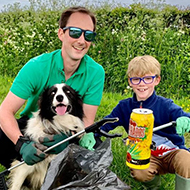Penrith clinic celebrates environmental impact award

"Veterinary Vision is demonstrating its organisations commitment to minimising its environmental impact." - April Sotomayor.
A veterinary eye clinic is celebrating an award for its drive to cut its environmental impact.
Veterinary Vision, which has three clinics based in the north of England, has received a bronze award from Investors in the Environment (iiE), which runs an initiative to encourage companies to cut emissions and waste across the country.
The clinics in Penrith, Sunderland and Charnock Richard were judged in five areas of their environmental management by the iiE in order to receive the award.
Opened in 2017, the Penrith clinic contains many features to reduce its carbon footprint, and generates its own electricity via solar panels.
Veterinary surgeon at the clinic, Chris Dixon, said: “We’re very pleased that our commitment to address our environmental impact has been recognised by iiE.
“As part of the process, we created an environmental policy to outline our goals and commitments across the practices.
“We encouraged involvement from all members of staff and canvassed opinion on our key objectives. It was critical that we stepped forward as a team to make a real difference.”
April Sotomayor, iiE auditor, commented on the clinic's initatives: “Veterinary Vision has collected an impressive amount of data. In addition to utilities, Veterinary Vision also monitors isoflurane, general waste, dry mixed recycling, clinical waste, other healthcare waste, company van and staff mileage and paper use.
“Veterinary Vision has implemented actions to reduce waste and improve recycling, including the removal of plastic cups, installation of more and bigger recycling bins in consultation rooms and the purchase of reusable bottles and scrub hats.
“The practice has also engaged staff in a week of litter picking events around the practice, in the Lake District, Ullswater and St Bees Beach.”



 The Veterinary Medicines Directorate (VMD) is inviting applications from veterinary students to attend a one-week extramural studies (EMS) placement in July 2026.
The Veterinary Medicines Directorate (VMD) is inviting applications from veterinary students to attend a one-week extramural studies (EMS) placement in July 2026.